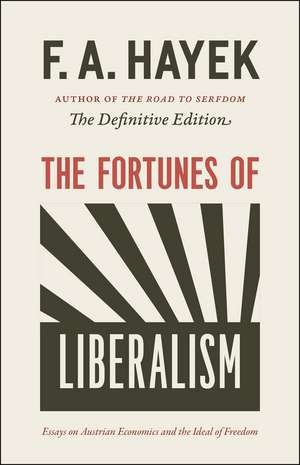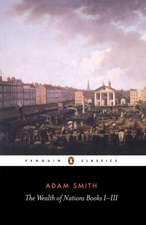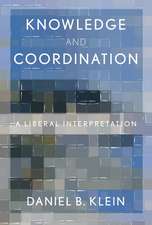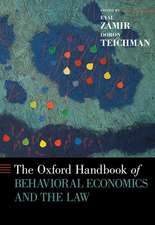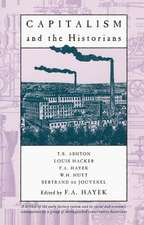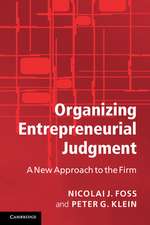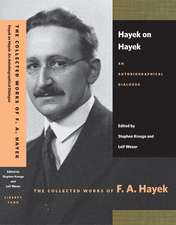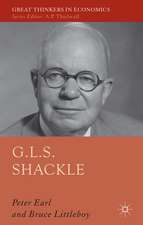The Fortunes of Liberalism: Essays on Austrian Economics and the Ideal of Freedom: The Collected Works of F. A. Hayek, cartea 4
Autor F.A. Hayek Editat de Peter G. Kleinen Limba Engleză Paperback – 21 iun 2021
The Reagan and Thatcher "revolutions." The collapse of Eastern Europe dramatically captured in the tearing down of the Berlin Wall. F. A. Hayek, "grand old man of capitalism" and founder of the classical liberal, free-market revival which ignited and inspired these world events, forcefully predicted their occurrence in writings such as The Road to Serfdom, first published in 1944.
Hayek's well-known social and political philosophy—in particular his long-held pessimistic view of the prospects of socialism, irrefutably vindicated by the recent collapse of the Eastern bloc—is fully grounded in the Austrian approach to economics. In this new collection, Hayek traces his intellectual roots to the Austrian school, the century-old tradition founded at the University of Vienna by Carl Menger, and links it to the modern rebirth of classical liberal or libertarian thought.
As Hayek reminds us, the cornerstone of modern economics—the theory of value and price—"represents a consistent continuation of the fundamental principles handed down by the Vienna school." Here, in this first modern collection of essays on the Austrian school by one of its preeminent figures, is the genesis of this tradition and its place in intellectual history.
Reflections on Hayek's days as a young economic theorist in Vienna, his opening address to the inaugural meeting of the Mont Pèlerin Society, and essays on former teachers and other leading figures in the Austrian school are included in volume 4. Two hitherto unavailable memoirs, "The Economics of the 1920s as Seen from Vienna," published here for the first time, and "The Rediscovery of Freedom: Personal Recollections," available for the first time in English, make this collection invaluable for Hayek scholars.
Hayek's writings continue to provide an invaluable education in a subject which is nothing less than the development of the modern world.
Hayek's well-known social and political philosophy—in particular his long-held pessimistic view of the prospects of socialism, irrefutably vindicated by the recent collapse of the Eastern bloc—is fully grounded in the Austrian approach to economics. In this new collection, Hayek traces his intellectual roots to the Austrian school, the century-old tradition founded at the University of Vienna by Carl Menger, and links it to the modern rebirth of classical liberal or libertarian thought.
As Hayek reminds us, the cornerstone of modern economics—the theory of value and price—"represents a consistent continuation of the fundamental principles handed down by the Vienna school." Here, in this first modern collection of essays on the Austrian school by one of its preeminent figures, is the genesis of this tradition and its place in intellectual history.
Reflections on Hayek's days as a young economic theorist in Vienna, his opening address to the inaugural meeting of the Mont Pèlerin Society, and essays on former teachers and other leading figures in the Austrian school are included in volume 4. Two hitherto unavailable memoirs, "The Economics of the 1920s as Seen from Vienna," published here for the first time, and "The Rediscovery of Freedom: Personal Recollections," available for the first time in English, make this collection invaluable for Hayek scholars.
Hayek's writings continue to provide an invaluable education in a subject which is nothing less than the development of the modern world.
| Toate formatele și edițiile | Preț | Express |
|---|---|---|
| Paperback (1) | 267.82 lei 6-8 săpt. | |
| University of Chicago Press – 21 iun 2021 | 267.82 lei 6-8 săpt. | |
| Hardback (1) | 1331.58 lei 6-8 săpt. | |
| Taylor & Francis – 2 apr 1992 | 1331.58 lei 6-8 săpt. |
Preț: 267.82 lei
Nou
Puncte Express: 402
Preț estimativ în valută:
51.25€ • 53.75$ • 42.66£
51.25€ • 53.75$ • 42.66£
Carte tipărită la comandă
Livrare economică 01-15 aprilie
Preluare comenzi: 021 569.72.76
Specificații
ISBN-13: 9780226155340
ISBN-10: 022615534X
Pagini: 287
Dimensiuni: 152 x 229 x 20 mm
Greutate: 0.4 kg
Ediția:Definitive
Editura: University of Chicago Press
Colecția University of Chicago Press
Seria The Collected Works of F. A. Hayek
ISBN-10: 022615534X
Pagini: 287
Dimensiuni: 152 x 229 x 20 mm
Greutate: 0.4 kg
Ediția:Definitive
Editura: University of Chicago Press
Colecția University of Chicago Press
Seria The Collected Works of F. A. Hayek
Notă biografică
F. A. Hayek (1899–1992), recipient of the Presidential Medal of Freedom in 1991 and cowinner of the Nobel Memorial Prize in Economics in 1974, was a leading proponent of classical liberalism in the twentieth century. Peter G. Klein is associate professor of applied social sciences and director of the McQuinn Center for Entrepreneurial Leadership at the University of Missouri.
Cuprins
Editorial Foreword
Introduction
Part I. The Austrian School of Economics
Prologue. The Economics of the 1920s as Seen from Vienna
Addenda: John Bates Clark (1847-1938)
Wesley Clair Mitchell (1874-1948)
1. The Austrian School of Economics
Addendum: In Britain and the United States
2. Carl Menger (1840-1921)
Addendum: The Place of Menger's Grundsätze in the History of Economic Thought
3. Friedrich von Wieser (1851-1926)
4. Ludwig von Mises (1881-1973)
5. Joseph Schumpeter (1883-1950)
6. Ewald Schams (1899-1955) and Richard von Strigl (1891-1942)
Addendum: Strigl's Theory of Wages
7. Ernst Mach (1838-1916) and the Social Sciences in Vienna
Coda. Remembering My Cousin Ludwig Wittgenstein (1889-1951)
Part II. The Fortunes of Liberalism
Prologue. The Rediscovery of Freedom: Personal Recollections
Addenda: Tribute to Röpke
Röpke's Theory of Capital Formation
Hallowell on the Decline of Liberalism as an Ideology
8. Historians and the Future of Europe
9. The Actonian Revival: On Lord Acton
(1834-1902)
10. Is There a German Nation?
11. A Plan for the Future of Germany
Addendum: The Future of Austria
12. Opening Address to a Conference at Mont Pèlerin
13. The Tragedy of Organised Humanity: de Jouvenel on Power
14. Bruno Leoni (1913-1967) and Leonard Read (1898-1983)
Editor's Acknowledgments
Chronological List of Contents
Index
Introduction
Part I. The Austrian School of Economics
Prologue. The Economics of the 1920s as Seen from Vienna
Addenda: John Bates Clark (1847-1938)
Wesley Clair Mitchell (1874-1948)
1. The Austrian School of Economics
Addendum: In Britain and the United States
2. Carl Menger (1840-1921)
Addendum: The Place of Menger's Grundsätze in the History of Economic Thought
3. Friedrich von Wieser (1851-1926)
4. Ludwig von Mises (1881-1973)
5. Joseph Schumpeter (1883-1950)
6. Ewald Schams (1899-1955) and Richard von Strigl (1891-1942)
Addendum: Strigl's Theory of Wages
7. Ernst Mach (1838-1916) and the Social Sciences in Vienna
Coda. Remembering My Cousin Ludwig Wittgenstein (1889-1951)
Part II. The Fortunes of Liberalism
Prologue. The Rediscovery of Freedom: Personal Recollections
Addenda: Tribute to Röpke
Röpke's Theory of Capital Formation
Hallowell on the Decline of Liberalism as an Ideology
8. Historians and the Future of Europe
9. The Actonian Revival: On Lord Acton
(1834-1902)
10. Is There a German Nation?
11. A Plan for the Future of Germany
Addendum: The Future of Austria
12. Opening Address to a Conference at Mont Pèlerin
13. The Tragedy of Organised Humanity: de Jouvenel on Power
14. Bruno Leoni (1913-1967) and Leonard Read (1898-1983)
Editor's Acknowledgments
Chronological List of Contents
Index
Recenzii
`(Volumes 3 and 4) contain some fascinating material which will be of considerable interest to all students of Hayek and twentieth-century liberalism ... The editing is excellent and the notes are very useful' - Political Studies
Descriere
Descriere de la o altă ediție sau format:
In this new collection of essays, F.A. Hayek traces his intellectual roots to the `Austrian school' of economics and links it to the modern rebirth of classical liberal thought. Includes much previously unpublished material.
In this new collection of essays, F.A. Hayek traces his intellectual roots to the `Austrian school' of economics and links it to the modern rebirth of classical liberal thought. Includes much previously unpublished material.
